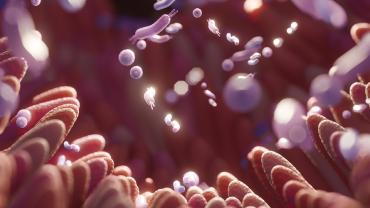
The gut-brain axis is a biochemical signaling pathway that’s believed to influence mood and brain functioning. Depression is a complex mental health disorder that is the second leading cause of disability globally. Microbiota-driven inflammatory responses and other alterations to the gut microbiome have been linked to mood-related changes and psychiatric disorders including depression. A recent clinical trial explored the impact of high-dose, short-term probiotic supplementation on parameters related to depression.
A double-blind randomized controlled trial was recently published in Translational Psychiatry by Schaub and colleagues who explored the potential relationship between probiotic supplementation and clinical outcomes related to depression. The study designers aimed to investigate if short-term high-dose probiotic supplementation could impact depressive symptoms and biomarkers related to the gut microbe and neural changes. Participants were randomized to a placebo or treatment group. The treatment consisted of daily supplementation for 4 weeks with probiotic strains containing 900 billion colony-forming units (CFUs). The probiotic strains were Streptococcus thermophilus NCIMB 30438, Bifidobacterium breve NCIMB 30441, Bifidobacterium longum NCIMB 30435 (re-classified as B. lactis), Bifidobacterium infantis NCIMB 30436 (re-classified as B. lactis), Lactobacillus acidophilus NCIMB 30442, Lactobacillus plantarum NCIMB 30437, Lactobacillus paracasei NCIMB 30439, and Lactobacillus delbrueckii subsp. Bulgaricus NCIMB 30440 (re-classified as L. helveticus). Major study parameters were assessed at baseline, week 4, and 4 weeks after treatment concluded (at week 8). Depressive symptoms were assessed using the Hamilton Depression Rating Scale (HAM-D).
Study results indicate that increases in the genus Lactobacillus were linked with decreases in depressive symptoms in the treatment group. In addition, according to measurements in brain activity, supplementation with probiotics was shown to change the activation of the putamen during emotional processing and the volume of gray matter in the calcarine sulcus. Also, HAM-D scores showed continuous improvement at the study terminus and again 4 weeks after treatment concluded.
The authors’ overall conclusion was that probiotic supplementation in the treatment group was associated with improvements in self-reported depressive symptoms based on HAM-D scores as compared to a placebo. Probiotic supplementation was also associated with improvements in biomarkers associated with gut microbiome health, including species richness. Limitations to the study include a relatively small sample size and study duration.
Researchers continue to elucidate the complexities of the gut-brain axis and the potential health-supportive role of probiotics. While more data are needed before clinical conclusions can be made, supplementation and diets rich in probiotics may influence the gut-brain axis and help support mood health.
By Colleen Ambrose, ND, MAT